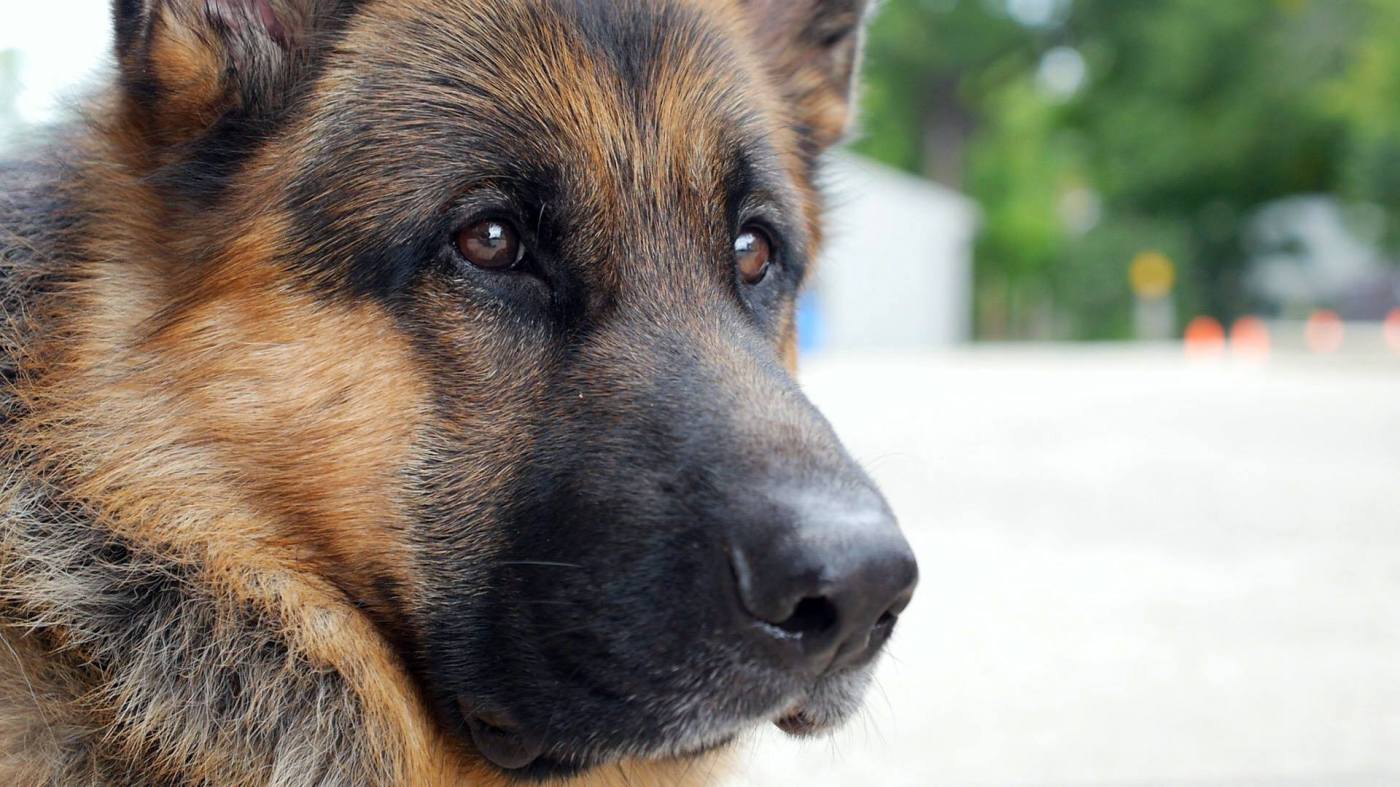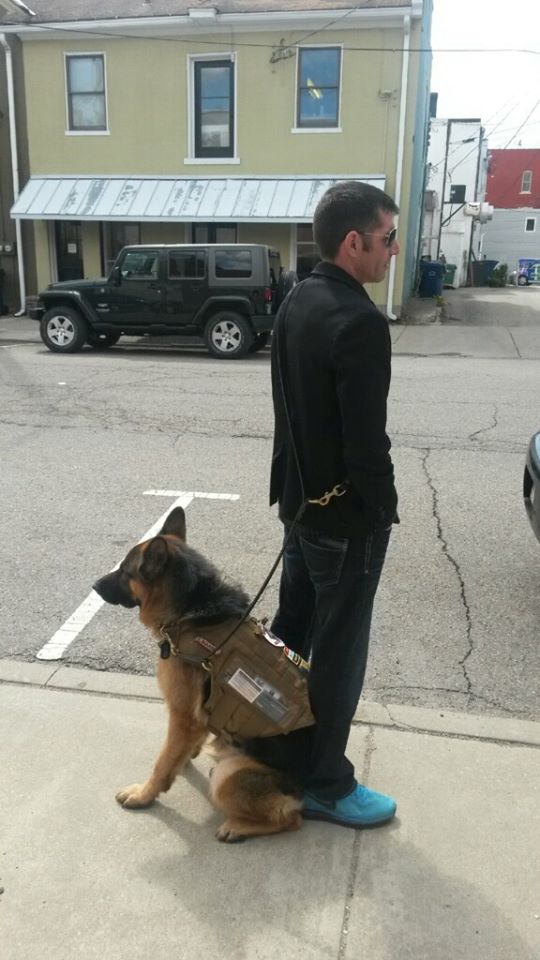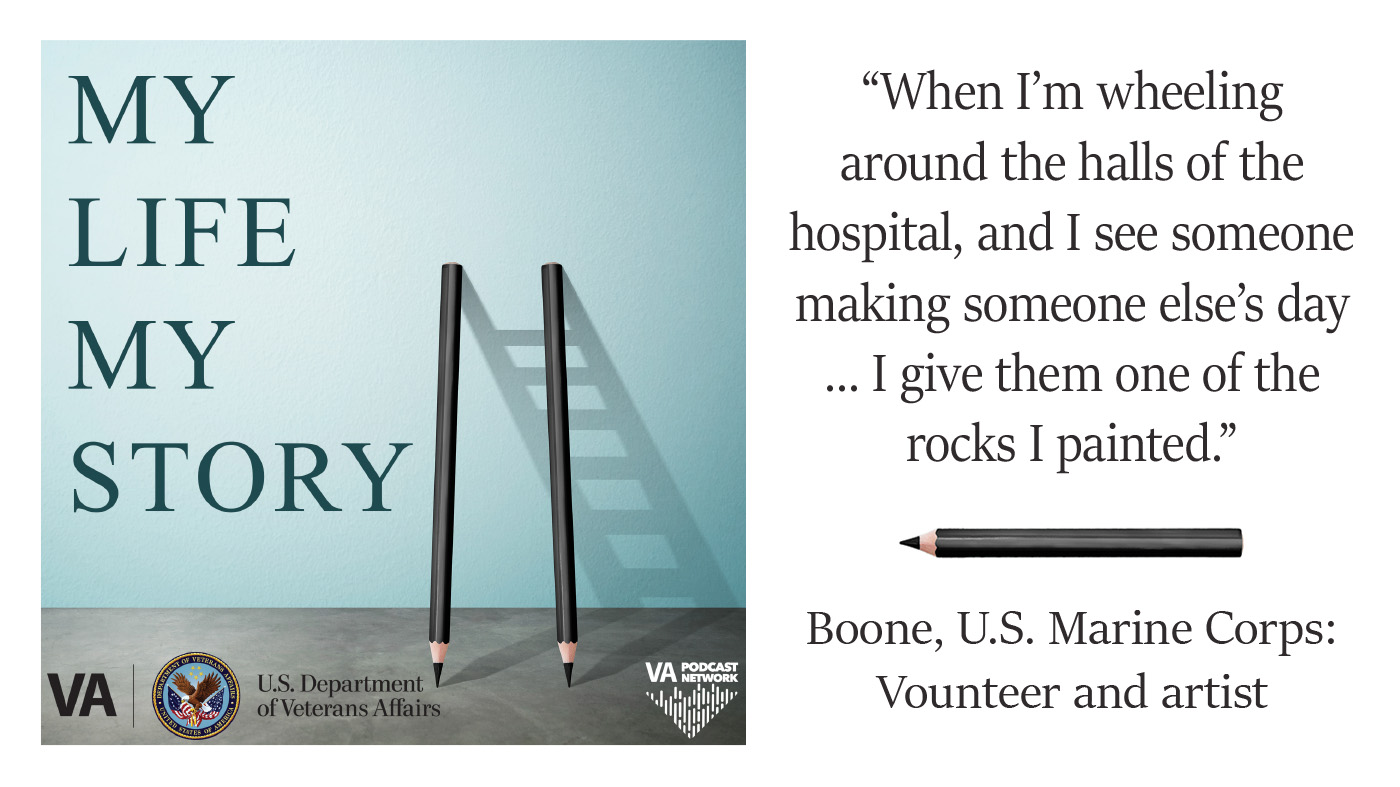Kenny Bass liked his job. As a 22-year-old Marine participating in the initial invasion of Iraq, life couldn’t have been more exciting.
“I was part of the combined anti-armor platoon,” he explained. “It was the ‘CAAT platoon.’ We were doing a lot of counter-ambush patrols, the insurgents were attacking Red Cross personnel, civilian contractors and other non-combatants. So we were tasked with going out and trying to solicit an attack. We were Infantry Marines, and young, so most of us were pretty excited about doing that kind of work. We had heavy-duty machine guns and anti-tank missiles.”
Nothing Major
About four months into his tour, the odds caught up with the young Infantry Marine. The unarmored Humvee he was riding in struck an IED.

When Veteran Kenny Bass was at the Dayton VA, receiving medical attention for a kidney stone, Atlas was there by his side.
“I was sitting in the passenger side rear, and the IED blew up by the right front bumper,” he said. “Nobody got killed, and I just took a couple pieces of shrapnel to my face, nothing major. I think the blast wave injury was the major thing.”
Nevertheless, by the time he returned home from Iraq in early 2004, Bass was a different man.
“My friends noticed a change in me,” he said. “I was depressed. And I was anxious. I remember going to a flea market one time and that’s when I had my first panic attack, because of all the people there. It was like I was still in Iraq, where just about everyone you see is a potential threat. I hated going out to eat or going to the mall or anything like that.”
104 in a 65 Zone
As if depression, anxiety and panic weren’t enough, another symptom began to surface. Anger.
“I was walking around with an anger level of about seven or eight,” Bass explained. “One time I got pulled over by the California Highway Patrol for doing 104 mph. I got mad at the cop for pulling me over. I was such a jerk. It didn’t take much to tip me off.”
At home, the 33-year-old Veteran’s garage became his haven.
“I’d sit out there all day smoking cigarettes,” he said. “I could see the street from there, which made me feel safe, and I could also hear what was going on in the house. So I had everything covered.”
From Bad to Worse
To dull the anxiety and the fear, the former Marine turned to alcohol.
I started drinking a lot,” he said. “Of course the alcohol just made things worse. I got to the point where I hated to wake up in the morning. I hated my life. I wanted to be healthy again. I wanted to work again and not be on disability.”
In an effort to get his life back, Bass headed over to the Dayton VA Medical Center in 2007. There he began therapy sessions with Bill Wall, a clinical social worker who had served in the military for 30 years.
“Kenny went through our therapy program here at Dayton,” Wall explained, “but it was clear that he was still having some issues with personality changes, hyper-vigilance, anxiety, depression, anger and other symptoms related to post traumatic stress. When he would go out in public, he just didn’t feel safe or in control. I thought maybe a psychiatric service dog might be a good next step for him, so I recommended he look into it.”
Safety Net
Wall, a Veteran of Operation Iraqi Freedom, had good reasons for thinking a service dog might be the game-changer Kenny Bass was desperately in need of.
“You can feel a lot more safe with a dog around you,” the social worker observed. “The dog has been trained to pick up on any fear or anxiety you might be feeling. They can actually smell it. The dog then does something to distract you or make you feel less anxious. When you become overloaded, the dog knows it and helps you refocus. Even before you realize you’re overloaded, the dog will pick up on it. For example, if you’re in a crowd of people and you begin showing subtle signs of distress, your dog will try to create a buffer zone around you. The dog is trying to give you a sense of safety.”
“A psychiatric service dog is…always focused on taking care of you.”
And when the world seems like a safer place, chances are you’re more likely to get out there and participate in it, Wall observed.
“The dog can help you have successful outings,” he said, “and the more successful outings you experience, the better you get at it. Your new experiences gradually begin to replace your old, traumatic experiences. You’re re-learning your behavioral script.”
Back From the Brink
In 2012, after doing a little research, Kenny Bass was able to get himself paired up with an 18-month-old German Shepard named Atlas, a highly-trained service dog provided by a non-profit called Instinctive Guardians.
“Atlas became my support system,” Bass said. “He could tell when I was having nightmares. He’d jump on the bed, lick my face and wake me up. A few weeks after I got him I was sitting alone in my garage, as usual. He came over and dropped his ball in my lap. Five minutes later I was out in the backyard with him, in the sunshine, throwing the ball for him.
“If you’re a Veteran, and suicidal, a little thing like that can be lifesaving,” Bass continued. “Atlas definitely brought me back from the brink. He’s such a character now. He gets me laughing.”
The Watcher
Aside from being a natural comedian, Atlas also serves as a competent body guard.
“When we’re out, I can trust Atlas to be vigilant for me,” Bass said. “I’m experiencing more things now because of him. When we’re somewhere crowded, he’ll block for me. He’ll walk back and forth behind me to keep people from getting too close.
“And when I tell him to ‘post,’ he sits down on my right side, facing the other way. If somebody approaches me from behind, he’ll nudge me. He’s alerting me. It’s a good feeling knowing he’s watching and that I don’t have to.”
Having turned his life around two years ago with the help of Atlas, Bass decided it was time to start giving back. In 2013 he helped found The Battle Buddy Foundation, a non-profit that trains service dogs for Veterans struggling with post-traumatic stress.
“When you’re in combat, you don’t go anywhere without a buddy, someone to watch your back,” Bass said. “That’s where the term ‘Battle Buddy’ comes from.”
He added: “It’s a good feeling to know someone always has your back.”
To learn more about how VA is helping Veterans with PTSD, visit the VA National Center for PTSD Website at www.ptsd.va.gov
Topics in this story
More Stories
MVP looks at the background and impact of Women’s History Month.
March is National Kidney Month, an annual campaign to raise awareness about the importance of kidney health and how to maintain it.
In the story featured in this episode of "My Life, My Story," Boone's life is a "flash" story, where there's a before and then what came after.







THIS IS BEATIFUL STORY AND WE NEED MORE OF THIS KIND TERAPY FO THE VETERANS.
What a great article – Thank you so much for sharing your story and thank you to the VA for sharing with the public! Thank you to The Battle Buddy Foundation for working so hard to help those who have served our Country! Your passion, heart and support for our service men and women is a blessing and a gift! Keep up the good work! God Bless
This is great! As a police k9 officer with PTSD after a shooting ,K9 Alex is a great comfort for me. Alex is retired now but he really helps me when I’m have ” a day”. He can read me like a book and knows when I need someone to hang with and decompress.
I’m glad non-veterans are are writing in! We may be the “poster children” for PTSD, but it is not unique to us. Ms. Walton, & others asking the same question, YES, there are groups that provide dogs for people in need. Just “google” it. Also, I have found good relief from my “demons” thru a program called Horses With Heart. They provide horsemanship classes & therapeutic interaction with well-mannered, trained horses. Maybe see if there is a “Therapeutic Horse Program” in your area. My county actually provides grants to help offset the cost. Good luck!
This is so great for our Vetersns. I am wondering if people like my son who has the same symptoms of Kenny Bass but not caused by war, PTSD, from life’s traumas can get a dog like Atlas. Are there any organizations like that? Does Canine Companions service people with PTSD from life’s traumas?
Checkout the website at “ADA.gov” John. The VA has no PTSD Service Dog program. The only veterans the VA provides Service Dogs to are visually impaired and a very limited few other disabilities mostly physical. The VA tends to follow the very politically connected and internationally funded Assistance Dog International (ADI) guidelines and they do not train, certify, or recognize Psychiatric Service Dogs. If you are seeking assistance for a PTSD service dog then you will have to find a civilian source. Kenny finding someone like Bill Wall at the Dayton VA was a fluke happening. Notice it was only after all other treatments failed that the VA employee recommended he seek a civilian source because the VA does not provide this type of effective treatment.
I would love a German Shepherd,because I have Alot of health issues and I have Ptsd,but I wasn’t in the military.Although I am a golden star young child when my dad died…but I am not a child anymore..I have family that are And were vets..thank you and God bless
Your story is my story Kenny except I did not encounter a VA employee as aware as the one you did. I suffered for decades through all sorts of medications, group sessions, and other treatments. It wasn’t until I obtained Social Security disability and met a combat medic turned doctor that I found my hero medical person who quickly noticed the harm my VA health people were doing to me and especially to my kidneys that he counseled me to consider the benefits of a Psychiatric Service Dog as an alternative to being killed by the VA. My family and I are so blessed to have found our savior for my life and for my family. The VA was not allowed to help veterans in this way so I’ve had to use a lot of civilian aid services to both get my fully trained Psychiatric Service Dog, keep him (10 pound Yorkie) healthy, and eliminate all of the VA treatments that were killing me. PLEASE if any veterans are reading this understand that the VA is not always able to help in the right way or have the right capabilities to help but don’t give up.
I am a vietnam veteran, receiving 100% disability for PTSD and interested in receiving a service dog, pleas send information. thank you
Checkout the website at “ADA.gov” John. The VA has no PTSD Service Dog program. The only veterans the VA provides Service Dogs to are visually impaired and a very limited few other disabilities mostly physical. The VA tends to follow the very politically connected and internationally funded Assistance Dog International (ADI) guidelines and they do not train, certify, or recognize Psychiatric Service Dogs. If you are seeking assistance for a PTSD service dog then you will have to find a civilian source. Kenny finding someone like Bill Wall at the Dayton VA was a fluke happening. Notice it was only after all other treatments failed that the VA employee recommended he seek a civilian source because the VA does not provide this type of effective treatment.
Also, follow along with our daily updates on Facebook at: http://www.facebook.com/battlebuddy
To learn more about The Battle Buddy Foundation, check out our website at: http://www.tbbf.org
Wonderful story! Very touching. I’m not mentioning them as a way to pose competition for Instinctive Guardians, but as an additional resource available to those in need, including veterans. Author Dean Koontz has written several books that include dogs as extraordinary characters. He’s been a long-time supporter of Canine Companions for Independence. They train service dogs in several areas, including training tailored to the various needs of veterans. http://www.cci.org/site/c.cdKGIRNqEmG/b.4011033/k.D44E/Veterans.htm
I am extremely happy that your buddy has had such a positively profound effect on your life, Mr. Bass. And, as always, I thank you profusely for your service.
The dogs very important for injured and reconvalescent soldiers.
All soldiers are heros.
I will say, God with you and God bless you.
Europe is proud for you.
Jana Dedek
Mr. Cramer, Thank you for this article! MY BROTHER, KENNY, thank you for sharing your life & story with us. Whether you believe in God or not, it should be obvious that animals were created to help & keep humans company. The Cherokee People have an old story abt how the dog became man’s best friend. You & Atlas will grow even closer as time goes by; I know, because I have a service dog, too. One of the hardest things for me (us), is that my “little girl” is a 13-pound ShihTzu, & people think a service dog has to be big, like Atlas. Even with her service vest on, people hassle me, & aggravate my PTSD. I recommend ANYONE with a service dog take everywhere they go, & although it is not required by the ADA, we should always have their vest on them or their ID card avail. We ALL should also contact our elected “representatives”, & have them put the online “service dog” registration places out of business! They will register a dog that has never been trained for anything, for the right price!
Things will get better, now that you have your buddy! Take care of each other; now you are REALLY never alone! God bless you both!
Thanks for the kind words Danny. I couldnt agree more. My life has absolutely changed for the better alongside my service dog, Atlas — it sure beats the piles of medications that I used to be prescribed. Thanks brother — Semper Fi